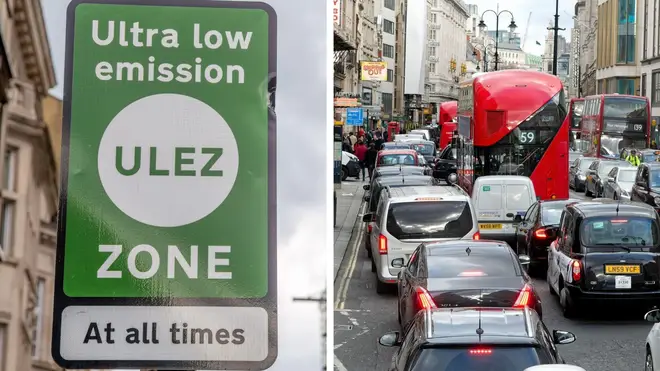
Tom Swarbrick 4pm - 6pm
18 October 2021, 14:12 | Updated: 10 November 2021, 15:17

The Ultra Low Emission Zone (ULEZ) is set to be expanded from tomorrow. Find out where it will apply and if your car is exempt.
The ULEZ has operated since April 2019, covering the same area of central London as the Congestion Charge.
However, the area affected is soon due to expand, becoming 18 times larger across the capital.
The extra charge for older and heavily polluting vehicles will also apply in the areas covered all day, every day. The only exception is Christmas Day.
The ULEZ charge is £12.50 for cars, smaller vans, motorbikes and other lighter vehicles that do not meet the standard.
Drivers can pay by midnight on the third day following the journey or up to 90 days in advance.
Fail to pay on time and you risk getting a Penalty Charge Notice (PCN) of £160, reduced to £80 if paid within 14 days.
The expansion will take place from 25 October. Transport for London (TfL) is urging drivers to check their vehicles ahead of the change.
It marks around two and a half years since the zone was first introduced to roads in central London.
However, stricter emission standards have applied to buses, coaches and lorries across the whole of London since 26 October 2020.
Read more: 'Terrible' Tories are 'outsourcing' UK carbon emissions, Green Party peer claims
Read more: Eco protesters to suspend blocking roads after drivers fight back

Sadiq Khan Refuses To Give Charities An Exemption To ULEZ
Every road within the North and South Circulars roads will become a part of the ULEZ. The North and South Circular Roads themselves are not included in the zone.
Those passing through or making a short trip in the zone - using a vehicle that does not meet the ULEZ emissions standards - will be expected to pay the daily fee.
However, if you are parked within the zone but do not drive, you will not need to pay.
It has been estimated that 100,000 cars, 35,000 vans and 3,000 lorries could potentially be affected by the tighter standards in the expanded area every day.
However, TfL has said that more than 80 per cent of vehicles in the wider zone will not be charged.
It is older, more polluting vehicles that will be liable for the £12.50 daily fee.
For diesel cars to avoid the charge, they must generally have been first registered after September 2015, while most petrol models registered from 2005 are also exempt.
TfL's online checker can help drivers double-check whether they will be charged if they enter the zone, with 10 million having already used the tool to find out.

Choked Up co-founder underlines dangers of air pollution
Alex Williams, TfL's director of city planning, said: "We don't want drivers to get caught out on October 25, we are advising people to use our checker to see if their vehicle meets the standards.
"If they are liable for the charge we would ask them to consider using public transport, or to walk or cycle if possible, and if they need to drive, consider using a car club whose fleets are fully Ulez compliant, or switching to the cleanest vehicle."
Read more: Tory Minister: 'It's not flying that's the problem, it's emissions'
Meanwhile, Mayor of London Sadiq Khan said: "London's toxic air is a health crisis causing long-lasting harm to our children and contributing to thousands of premature deaths.
"The Ultra Low Emission Zone has already cut nitrogen dioxide pollution by nearly half in central London and the expansion of the zone on October 25 means many more Londoners across the city will enjoy the benefits of cleaner, healthier air.
"We need bold action to clean up London's air and whilst it's encouraging that four out of five vehicles now meet the current standards and won't have to pay the ULEZ charge, I advise all drivers to use the TfL checker to make sure your vehicle is ULEZ compliant.
"Our scrappage scheme will continue supporting motorists to ditch their polluting cars and make the switch to greener forms of transport as we drive towards a green recovery."